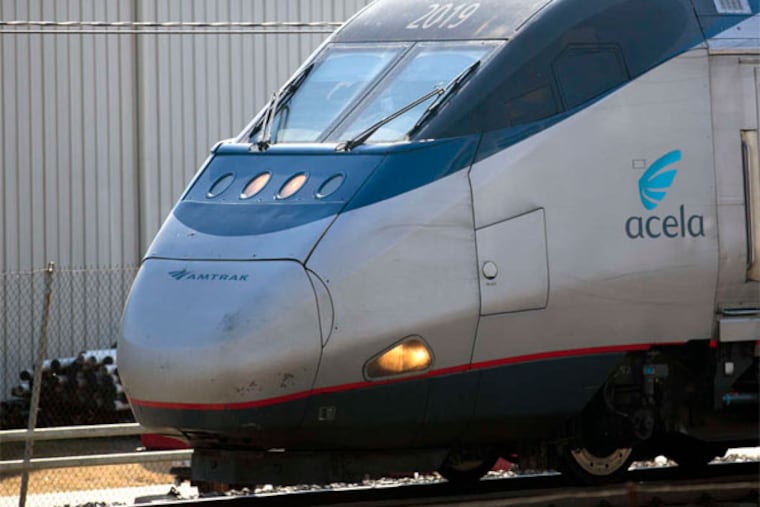Amtrak's on-time performance runs off the rails
Amtrak trains have been late nearly 30 percent of the time in the last 12 months, considerably worse than the year before.

Amtrak trains have been late nearly 30 percent of the time in the last 12 months, considerably worse than the year before.
Part of the problem, Amtrak says, is that most of its routes operate on tracks owned and controlled by freight railroads. And a federal-court decision last year - which is now headed to the U.S. Supreme Court - undercut Amtrak's ability to compel freight operators to give priority to passenger trains.
In the 12 months ending in June, only two of 33 Amtrak routes met the railroad's nationwide goal of 85.5 percent on-time performance.
In the eight months ending in May, Amtrak's on-time record was 73.6 percent, down from 85.1 percent in the same period a year earlier. And June was worse than May on 24 of 33 routes.
Bad weather and trouble-plagued equipment got much of the blame. Heavy snowfalls last winter slowed trains in much of the country, Amtrak spokesman Craig Schulz said Wednesday.
"Poor on-time performance is not acceptable," Schulz said. "It inconveniences our customers, and it impacts our business by increasing expenses and decreasing ridership."
"It's something we're taking very seriously," he said. "Our goal is to get better."
While Amtrak cited delays caused by "host" freight railroads on most of its long-distance routes, on-time performance has declined even on Amtrak's own tracks in the Northeast Corridor.
Two major construction projects, in central New Jersey and Maryland, contributed to those delays by taking one track out of operation, Schulz said.
Acela Express trains, Amtrak's fastest and most-expensive trains, were on time just 76 percent of the time in the eight months ending in May, compared with 89.3 percent during the same period a year earlier.
In June, Acela on-time performance fell to 72.9 percent.
Northeast Regional trains, which also operate between Washington and Boston, were on time 76 percent of the time for the first eight months of fiscal 2014, compared with 86.7 percent in the same period in fiscal 2013.
The worst performing Amtrak routes last month were the California Zephyr, with a 5 percent on-time record on its runs between Chicago and San Francisco, and the Capitol Limited, also 5 percent on time, in operation between Chicago and Washington, D.C.
Only slightly better were the Heartland Flyer (8.3 percent on time) between Oklahoma City and Fort Worth, and the Empire Builder (16.5 percent) between Chicago and Seattle.
The best performers last month were the Capitol Corridor trains between San Jose and Sacramento (94.2 percent), the Pennsylvanian between Pittsburgh and New York City (93.3 percent), and the Keystone between Philadelphia and Harrisburg (91.4 percent).
Amtrak hopes to get some help soon from the Supreme Court.
The high court agreed last month to rule on the constitutionality of a 2008 federal law that lets Amtrak help set on-time performance standards that can penalize freight railroads.
By law, passenger trains have priority over freight traffic.
But the freight railroads sued to block the 2008 law that required Amtrak and the Federal Railroad Administration to jointly set performance standards for Amtrak. The freight lines argued the law unconstitutionally delegated legislative power to Amtrak, a private corporation.
The on-time standards that took effect in 2010 required Amtrak to have on-time performance between 80 percent and 95 percent, depending on the route.
The freight lines argued that "Amtrak seized that competitive advantage by drafting regulations that require the freight railroads to modify their operations and delay freight traffic in order to benefit Amtrak's for-profit business."
A federal court rejected the freight railroads' arguments, but the U.S. Court of Appeals for the D.C. Circuit ruled for the freight operators. It ruled last year that even though Amtrak is subject to government oversight, it remains a for-profit company that cannot be given regulatory authority.
Declines in Amtrak on-time performance on freight railroads quickly followed the court ruling, Schulz said.
"Without a doubt, we saw an immediate drop in on-time performance across the board," Schulz said. "We are working with the host railroads . . . reminding them that priority dispatching of passenger trains remains the federal law."
Amtrak has never made a profit since it was created by Congress in 1970 to take over passenger rail service from the nation's bankrupt private railroad companies.
The Obama administration, in appealing to the Supreme Court, argued in May that Amtrak is "a government-created, government-controlled and government-subsidized corporation" that "is not a private entity for purposes of the constitutional analysis here."
The Supreme Court is scheduled to hear arguments in the case in its next term, which begins in October.